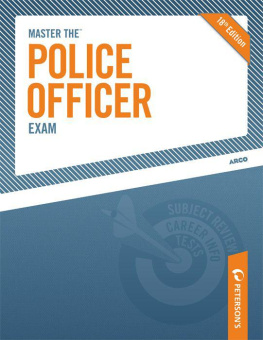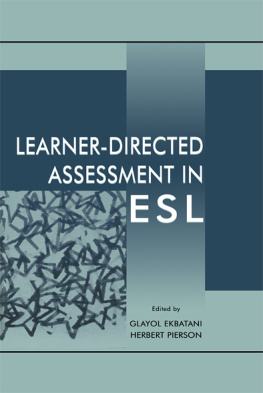Written Exercises
for the Police Recruit
Assessment Process
Written Exercises
for the Police Recruit
Assessment Process
Richard Malthouse
Jodi Roffey-Barentsen
Acknowledgements
The authors would like to thank the following for their assistance with this book: Peter Kennard, Chrissie Coles, Dimitri Agejev, Dino Gomez and Emma Walkerdine.
First published in 2009 by Learning Matters Ltd
All rights reserved. No part of this publication may be reproduced, stored in a retrieval system, or transmitted in any form by any means, electronic, mechanical, photocopying, recording, or otherwise, without prior permission in writing from Learning Matters.
2009 Richard Malthouse and Jodi Roffey-Barentsen
British Library Cataloguing in Publication Data
A CIP record for this book is available from the British Library.
All characters, organisations and places mentioned in this publication are fictitious and any resemblance to real persons, living or dead, organisations or places, is purely coincidental.
ISBN: 978 1 84445 266 8
The rights of Richard Malthouse and Jodi Roffey-Barentsen to be identified as the Authors of this Work have been asserted by them in accordance with the Copyright, Designs and Patents Act 1988.
Cover design by Topics The Creative Partnership
Text design by Code 5 Design Associates Ltd.
Project management by Diana Chambers
Typeset by Kelly Gray
Printed and bound in Great Britain by TJ International Ltd., Padstow, Cornwall
Learning Matters Ltd
33 Southernhay East
Exeter EX1 1NX
Tel: 01392 215560
info@learningmatters.co.uk
www.learningmatters.co.uk
Contents
Introduction to the
Written Exercises
The written exercises are an important part of the Police and PCSO recruitment process and appear to be something that candidates are quite concerned about. This may be because most people now use a computer or mobile phone to communicate with each other, rather than the more traditional paper and pen. As a result, some of the skills associated with the ability to write a memo, proposal or formal letter are not practised regularly. The thought of putting pen to paper without the benefit of spell-check (the F7 key) can be a challenging proposition for some. In addition, many have come to rely on those red and green squiggly lines highlighting spelling errors or poor grammar and making suggested changes to documents without perhaps stopping to think about what they have done incorrectly. Further, if you find that you cant think of a particular word, the combination of the Shift and F7 keys takes you to a thesaurus from which you can choose an appropriate word from a carefully selected list. You are no longer expected to think entirely for yourself and there is a tendency to take this technological wizardry for granted. That is, until the computer is no longer available and you realise that, without these support structures, the task of writing can be quite daunting. This is compounded during the assessment process, as it is coupled with the fear of making a mistake, in the knowledge that you are being tested. As a result, the process of written communication within the assessment centre can be a cause of anxiety for many.
This book is written to reduce that anxiety. It concentrates on just the written exercises and consists of three parts.
- describes in detail how to prepare yourself for the assessment as it outlines the process and explains the rules of spelling, punctuation and grammar.
- offers written exercises for you to practise.
- .
Part 1
Preparing for the assessment
OBJECTIVES
By the end of you should be able to:
- identify the seven core competencies;
- explain the purpose of a written exercise;
- identify the four levels of competence;
- describe the process of the written exercise;
- recognise how to work wisely;
- recognise the mnemonic ICED;
- identify the general principles of written communication;
- explain the principles of spelling;
- explain the principles of punctuation;
- explain the principles of grammar;
- recognise the principles of reflective practice;
- engage in action planning;
- identify the SMART mnemonic;
- state the ten top tips for completing your written exercises.
The seven core competencies
You will be assessed against competencies that are relevant to the role of a police officer. What is a competency? A competency is a statement of how something should be done or performed. For example, Supports arguments and recommendations effectively in writing. It is observable and measurable and can be achieved by ensuring you reflect the advice provided within this book.
When your written work is assessed, consideration will be given to what you have written and how you have written it. The assessors will consider your written work in relation to the seven core competencies. A list of the competencies is shown below with a brief explanation of each (Cox, 2007).
1. Respect for race and diversity | Considers and shows respect for the opinions, circumstances and feelings of colleagues and members of the public, no matter what their race, religion, position, background, circumstances, status or appearance. |
2. Team working | Develops strong working relationships inside and outside the team to achieve common goals. Breaks down barriers between groups and involves others in discussions and decisions. |
3. Community and customer focus | Focuses on the customer and provides high-quality service that is tailored to meet their individual needs. Understands the communities that are served and shows an active commitment to policing that reflects their needs and concerns. |
4. Effective communication | Communicates ideas and information effectively, both verbally and in writing. Uses language and a style of communication that is appropriate to the situation and people being addressed. Makes sure that others understand what is going on. |
5. Problem solving | Gathers information from a range of sources. Analyses information to identify problems and issues and makes effective decisions. |
6. Personal responsibility | Takes personal responsibility for making things happen and achieving results. Displays motivation, commitment, perseverance and conscientiousness. Acts with a high degree of integrity. |
7. Resilience | Shows resilience, even in difficult circumstances. Is prepared to make difficult decisions and has the confidence to see them through. |











